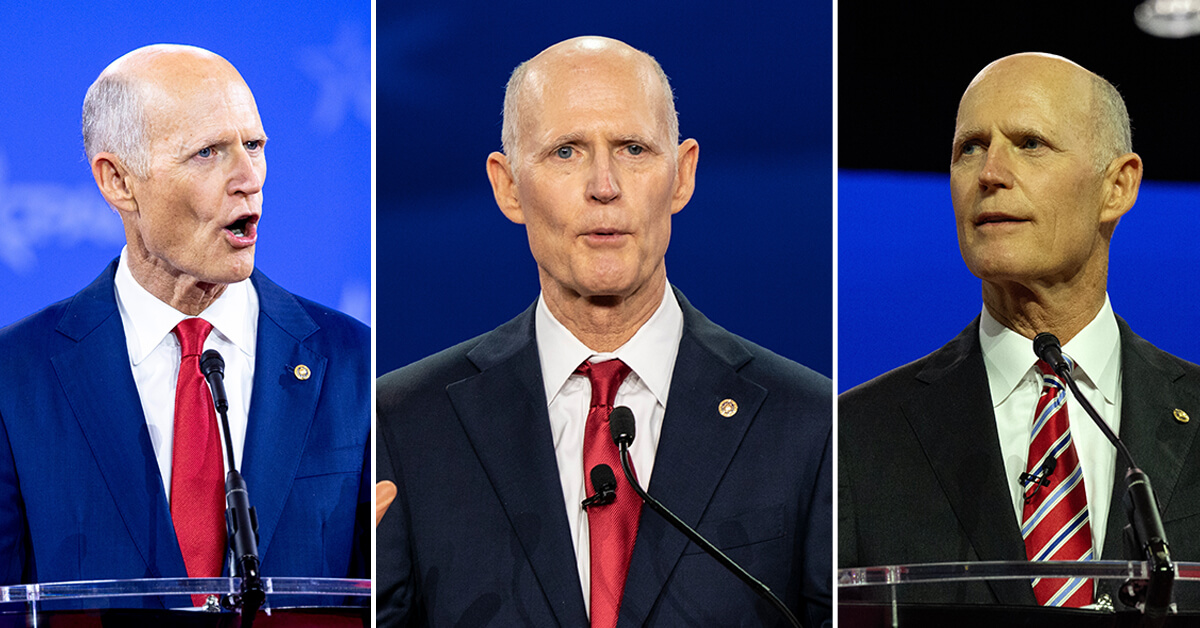May 6, 2025

Burda on Healthcare: Five Things I Should Have Asked Rick Scott
I’ve said this before, and my recent behavior confirms it. Most journalists are introverts. We become journalists because it forces us to go to things like news and press events and talk to people. That is, when we can’t interview them over the phone, via email or on Zoom without the camera on.
Good journalists also never make themselves the story. The story is the story. Not them. You can always identify a poor journalist by the length of the questions they ask. The longer the question, i.e., unending series of soliloquy-like opinionated statements to show how smart they are, the worse the journalist.
Now that I’ve tried to put myself in a positive light, let me tell you what happened.
I was in Tampa, Florida, staying at the Grand Hyatt Tampa Bay. I was covering a conference for a company I often work for. On Thursday, April 24, I went down the elevator from my room on the fourth floor to the first floor, where the opening keynote presentation was set for 9 a.m. I went down early, about 7:30 a.m., to scout out the ballroom and the best place to sit at the back and not talk to anyone.
I’m the only person on the elevator. The elevator door opens on the first floor, and Rick Scott is standing there, waiting for the elevator door to open and get in. The same Rick Scott who was chairman and CEO of Columbia/HCA Healthcare Corporation. The same Rick Scott who was the Republican governor of Florida. The same Rick Scott who’s now a Republican U.S. senator from Florida.
I know it was Rick Scott because I met him a few times when I was a reporter at Modern Healthcare back in the day. I wrote a number of stories critical of Columbia/HCA under Scott’s leadership, like the one that called the company out for implying it had won a Malcolm Baldrige National Quality Award. It did not.
Anyway, the elevator door opens. Rick Scott is standing there. Alone. No security detail. No staff. No suit. No tie. Khakis and a button-down. I look him in the eye. He looks me in the eye.
- I say, “Rick Scott?”
- He says, “Yes.”
- I say, “Dave Burda. I worked for Modern Healthcare. I wrote about you when I was a reporter.”
- He says, “Yes, I remember you, Dave. How are you?”
- I say, “I’m fine.”
- He says, “What are you doing now?”
- I say, “I’m a freelance reporter. Still covering healthcare.”
- He says, “Great.”
- I say, “Well, good to see you.”
- He says, “Thanks. Good to see you, too. Bye.”
- I say, “Bye.”
I have no recollection whether we shook hands. Then we each went about our business. I had an event to cover. He had business on another floor at the Grand Hyatt Tampa Bay.
About four steps toward my business in the keynote presentation ballroom, I was kicking myself. I totally and utterly whiffed on my opportunity to change history. How? I’m not sure.
I don’t support Rick Scott as a MAGA Republican, Trump enabler and member of a fascist regime trying to destroy our democracy. I don’t support him as the alleged mastermind of one of the biggest Medicare frauds in healthcare history. I still don’t understand why the U.S. Justice Department didn’t charge Scott with a crime. Not that Cheeto Jesus wouldn’t have let him out by now if Scott was still in jail.
Despite those strong feelings, I did nothing. I could have gotten back on the elevator with him and hit all the floor buttons and given him an earful. Well, at least until he got to the second floor and jumped off. At the very least, I could have shouted, “Vaccines don’t cause autism!” as his elevator door closed. But I did nothing.
That said, here’s what I would have said if I weren’t a journalist and an introvert who didn’t want to be the story.
- “Why would you support cutting federal Medicaid spending by $880 billion over 10 years when you know, as a former healthcare executive, that the poor, the disabled and children depend on Medicaid for health benefits to access medical care?”
- “Why would you support cutting federal Medicaid spending by $880 billion over 10 years when you know, as a former healthcare executive, that hospitals, especially safety netters, depend on Medicaid revenue to care for the poor, the disabled and children?”
- “Why would you support Robert F. Kennedy Jr. as United States Department of Health and Human Services Secretary when you know, as a former healthcare executive, that RFK Jr. knows nothing, zero, zip, about public health, chronic illness, disease prevention, the drug-approval process, medical research or anything any federal health agency under HHS does?”
- “Why would you call for all federal legislation to automatically sunset in five years without being passed again by Congress, as you stated in your 11 Point Plan to Recue America released in 2022, when you know that could end the Social Security and Medicare programs? (I know, a year later you caved under pressure and exempted Social Security and Medicare from your rescue plan.) As a senator from Florida, you know how much your constituents depend on both programs to live and access care. And as a former healthcare executive, you know how much hospitals and doctors depend on Medicare revenue to stay open.”
- “Why do you support the privatization of non-core government functions like Medicare? Don’t you know that Medicare Advantage plans are essentially defrauding the federal government by exaggerating how sick members are to obtain higher payment rates? I know you know about Medicare fraud.”
I know. Tough talk from someone who didn’t speak up when they had the chance and instead wrote about it from the safety of their home office. Maybe next time.
At least I didn’t call him governor or senator.
Thanks for reading.





